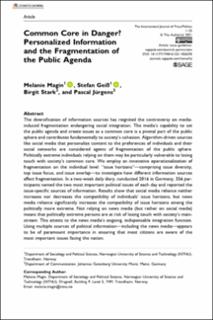| dc.contributor.author | Magin, Melanie | |
| dc.contributor.author | Geiss, Stefan | |
| dc.contributor.author | Stark, Birgit | |
| dc.contributor.author | Jürgens, Pascal | |
| dc.date.accessioned | 2022-03-01T08:46:00Z | |
| dc.date.available | 2022-03-01T08:46:00Z | |
| dc.date.created | 2021-12-07T23:52:14Z | |
| dc.date.issued | 2021 | |
| dc.identifier.citation | The International Journal of Press/Politics. 2021, . | en_US |
| dc.identifier.issn | 1940-1612 | |
| dc.identifier.uri | https://hdl.handle.net/11250/2981941 | |
| dc.description.abstract | The diversification of information sources has reignited the controversy on media-induced fragmentation endangering social integration. The media's capability to set the public agenda and create issues as a common core is a pivotal part of the public sphere and contributes fundamentally to society's cohesion. Algorithm-driven sources like social media that personalize content to the preferences of individuals and their social networks are considered agents of fragmentation of the public sphere. Politically extreme individuals relying on them may be particularly vulnerable to losing touch with society's common core. We employ an innovative operationalization of fragmentation on the individual level: “issue horizons”—comprising issue diversity, top issue focus, and issue overlap—to investigate how different information sources affect fragmentation. In a two-week daily diary, conducted 2016 in Germany, 356 participants named the two most important political issues of each day and reported the issue-specific sources of information. Results show that social media reliance neither increases nor decreases the compatibility of individuals' issue horizons, but news media reliance significantly increases the compatibility of issue horizons among the politically more extreme. Not relying on news media (but rather on social media) means that politically extreme persons are at risk of losing touch with society's mainstream. This attests to the news media's ongoing, indispensable integration function. Using multiple sources of political information—including the news media—appears to be of paramount importance in ensuring that most citizens are aware of the most important issues facing the nation. | en_US |
| dc.language.iso | eng | en_US |
| dc.publisher | SAGE | en_US |
| dc.rights | Navngivelse 4.0 Internasjonal | * |
| dc.rights.uri | http://creativecommons.org/licenses/by/4.0/deed.no | * |
| dc.title | Common Core in Danger? Personalized Information and the Fragmentation of the Public Agenda | en_US |
| dc.type | Peer reviewed | en_US |
| dc.type | Journal article | en_US |
| dc.description.version | publishedVersion | en_US |
| dc.source.pagenumber | 23 | en_US |
| dc.source.journal | The International Journal of Press/Politics | en_US |
| dc.identifier.doi | https://doi.org/10.1177/19401612211026595 | |
| dc.identifier.cristin | 1965852 | |
| cristin.ispublished | true | |
| cristin.fulltext | original | |
| cristin.qualitycode | 2 | |

